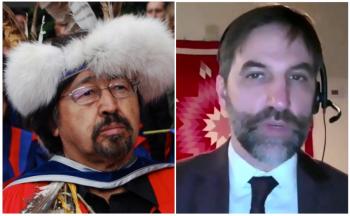Image Caption
Summary
Local Journalism Initiative Reporter
Windspeaker.com
Apologies: A correction has been made to paragraph eight. Two years from now language funding will increase to just over $115 million, not to $215 million as previously reported.
Canadian Heritage Minister Steven Guilbeault told chiefs at the Assembly of First Nations annual general assembly last week that the Indigenous Languages Act, which received Royal Assent in June 2019, is here to stay, whether or not the Liberals form the next government.
“Should a future government come in and want to do things differently, they would have to take apart the Act, which is possible, but it’s no small thing…. This (new) government would bare the brunt of public opinion across the country and opposition parties and obviously of Indigenous peoples across this country. Is it possible? Yes. Is it likely? I would say no,” Guilbeault said Dec. 8.
Guilbeault was responding to concerns voiced by Skeetchestn Band Chief Ron Ignace, who pointed out the Act was open to review every three years by a parliamentary committee of either MPs or senators or a combination.
Ignace said he was “suspicious” of the clause and wanted to know if the review committee could increase or decrease funding or strike down the legislation all together.
Senior associate deputy minister Gina Wilson said the reviews of the legislation, which also included a review every five years that was Indigenous-informed, “makes (the legislation) that much stronger” as both the minister and Indigenous organizations would be accountable.
Ignace also expressed concern with the $66 million budgeted to be spent in each of the next five years as it would have to be spread out over all Indigenous languages, as well as fund the office of the Indigenous language commissioner, reports and research.
“I don’t think that is sufficient considering the dire straits of our languages across the country,” said Ignace. “What we ought to be doing is seriously ramping up the resources for languages to turn the tide away from our languages falling into the precipice of extinction. There has to be serious consideration to that issue.”
Guilbeault agreed. He pointed out that when the Liberals came to office in 2015 the annual federal budget for Indigenous languages was $5 million. That figure has been increased to about $40 million this year, he said, but it is going up to at least $115 million, "which is clearly not enough. But that's a floor." Two years from now, the budget will be at least $115.7 million.
“The most interesting aspect of the (Indigenous Languages) Act is that the federal government is imposing upon itself the requirement to provide long-term funding, adequate funding for Indigenous languages,” said Guilbeault.
He stressed that point when Federation of Sovereign Indigenous Nations Chief Bobby Cameron and Oneida Nation of the Thames Chief Adrian Chrisjohn talked about the need for long-term, flexible funding.
Chrisjohn said a language centre on his nation, that was being expanded with $660,000 funding from the federal government and $227,000 own-source revenue from Oneida Nation, was coming under a deadline crunch and an extension for the work was required.
Cameron talked about the need to engage knowledge keepers in teaching young children their language and to compensate the knowledge keepers for their work.
“The Act and the implementation of the Act is for this Act to be at your service and not the other way around,” said Guilbeault. “We are moving … to multi-year funding, especially for something like languages. You can’t sustain, you can’t plan language programs if you don’t know from one year to another if the funding is going to be there.”
Ignace said it was important that First Nations had co-management of the legislation going forward, so it “would not become a straight-jacket, but it would become a living document.”
Guilbeault said the legislation was co-developed with Indigenous peoples and would be co-managed by Indigenous people.
“You say it needs to be a living body, a living Act and I agree, which is why there’s no number (financial figure) in the Act because as time changes the needs will change,” said Guilbeault.
The government is presently soliciting applications for a commissioner and up to three directors of Indigenous languages. The commissioner and directors are tasked with working with Indigenous peoples and their respective governments; other governing bodies, communities and organizations; the federal, provincial and territorial governments; and all Canadians to support the self-determined work of Indigenous peoples in reclaiming, revitalizing, maintaining and strengthening First Nations, Inuit and Métis languages.
A selection committee that includes First Nations, Inuit and Métis Nation representatives has been established to review applications and recommend candidates for appointment.
Guilbeault announced that Canada and national Indigenous organizations will co-host a languages symposium Jan. 25 to Jan. 29, 2021 which will bring together national and international experts who will share their knowledge and best practices on the revitalization of Indigenous languages, as well as discussion on funding models.
“A succession of Canadian governments were not your allies. If Indigenous languages are in a precarious position today, it’s because of the Crown in Canada and what this Act is is one attempt at correcting one of the wrongs. It won’t solve all the problems, but it is our way of working with you to try and correct those past mistakes that we were responsible for,” said Guilbeault.
“I have recently tabled a bill on Truth and Reconciliation Day and it looks like the bill is going to get unanimous support from the House of Commons. I think that we are entering a world where these things will be guided less by politics and more by what needs to be done regardless of which government is in power. That is my profound hope.”
The United Nations International Decade of Indigenous Languages will follow in 2022-2032.
Local Journalism Initiative Reporters are supported by a financial contribution made by the Government of Canada.

